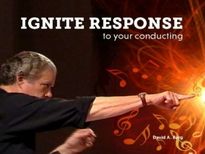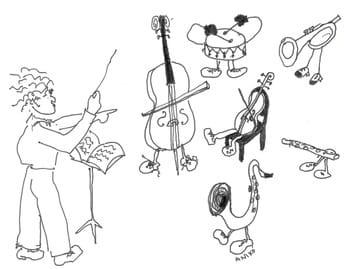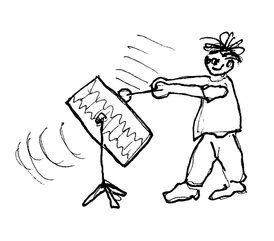Ignite Response to Your Conducting
How the Ignite Response/Learner-Centered Approach Works
How the Ignite Response/Learner-Centered Approach Works
|
As instrumentalists and singers, we've refined our abilities to sing and play softly, or with more passion, or more incisively.
But when we're conducting, we might unconsciously think that our gestures - not the young musicians - actually make the music. Instrumentalists might even subconsciously confuse the beat pattern with fingering charts - move something and music happens! |
Some music teachers even talk to our students as if they were instruments rather than people!
"Sara-the-Sax, can you play it a bit louder?"
"Vijay-the-Violin, more passion, please."
"Pablo-the-Percussionist, can that rat-a-tat-tat be a bit sharper?"
"Treesa-the-Trumpet, give it everything you got. I really mean it!"
This is the essence of Teacher-Centered education (TCE) : the teachers gives information to her students.
But merely giving information is basically ineffective in working with young musicians. It's our job to ignite their caring, attentive, involved, enthusiastic, and expressive response to our conducting. It's the young musicians who are now the instruments we must "play" (work and build rapport with, inspire, understand) as proficiently as we play our own instruments (including our vocal chords).
This is the essence of Learner-Centered education (LCE): igniting students' engagement, assessment, analysis, assumption of responsibility, and self examination. Widely researched, LCE is consistently documented to be far superior to TCE.
Igniting Response offers tested and proven step-by-step easy-to-do techniques to help school ensemble leaders harness this drive so their students regard ensemble participation as a process that meets their deepest needs. When school ensemble directors tap into this powerful motivating force, the involvement, concentration, and sense of ownership needed for great music making can be consistently achieved.
How we do this is what Igniting Response is all about.
"Sara-the-Sax, can you play it a bit louder?"
"Vijay-the-Violin, more passion, please."
"Pablo-the-Percussionist, can that rat-a-tat-tat be a bit sharper?"
"Treesa-the-Trumpet, give it everything you got. I really mean it!"
This is the essence of Teacher-Centered education (TCE) : the teachers gives information to her students.
But merely giving information is basically ineffective in working with young musicians. It's our job to ignite their caring, attentive, involved, enthusiastic, and expressive response to our conducting. It's the young musicians who are now the instruments we must "play" (work and build rapport with, inspire, understand) as proficiently as we play our own instruments (including our vocal chords).
This is the essence of Learner-Centered education (LCE): igniting students' engagement, assessment, analysis, assumption of responsibility, and self examination. Widely researched, LCE is consistently documented to be far superior to TCE.
Igniting Response offers tested and proven step-by-step easy-to-do techniques to help school ensemble leaders harness this drive so their students regard ensemble participation as a process that meets their deepest needs. When school ensemble directors tap into this powerful motivating force, the involvement, concentration, and sense of ownership needed for great music making can be consistently achieved.
How we do this is what Igniting Response is all about.
Conducting isn't Physics
|
When our friend strikes his bass drum with good technique and strong intent, he'll get a ringing "boom." Every time. It's physics.
When we conduct, our downbeat can be as clear, well prepared and as strongly intended as the percussionist's stroke. But unlike his bass drum, our students' response is not a matter of physics. Maybe they're not watching or they don't like the piece. They might be tired, worried about an exam, or have a family problem. |
To get the musical response we want, we need to create their active involvement by engaging them personally so that their self-talk is "This is important; I want to do my best!"
We can do this by helping them understand how watching and responding are important in their lives, and by giving them the thrilling, inspiring, life-changing experience of going beyond their comfort zones and realizing that's where life and growth are. When they have these experiences in our ensembles, they'll bring pencils, mark their music, and sing and play that ff !
Igniting Response is a learner-centered approach developed over two decades of research and practice that can bring about these desired responses consistently in ensembles at all levels and in all environments. This is my own personal experience.
We can do this by helping them understand how watching and responding are important in their lives, and by giving them the thrilling, inspiring, life-changing experience of going beyond their comfort zones and realizing that's where life and growth are. When they have these experiences in our ensembles, they'll bring pencils, mark their music, and sing and play that ff !
Igniting Response is a learner-centered approach developed over two decades of research and practice that can bring about these desired responses consistently in ensembles at all levels and in all environments. This is my own personal experience.
One way to use this approach and make a difference - tomorrow:
More simply: Ask...Don't Tell
Focusing on teaching – correcting mistakes by telling ensembles what to do – prevents students from becoming active, involved learners. If the conductor functions as their “brain and ears,” students are unlikely to use their own.
At your next rehearsal, ask rather than tell, wait patiently for the answers to come, listen thoughtfully, and respond honestly. Initially, this takes more time than stopping and correcting mistakes. But you'll soon begin saving time as levels of attention and involvement skyrocket with this approach; what a difference can happen in only one rehearsal!
"Why did I stop?"
Here's a dialogue I've been using for years. It never fails to create dramatic results by asking, rather telling, thus transferring responsibility for their experience to them. It's a powerful example of how the Learner-Centered Education model creates technical musical progress.
* Also: students (when they're awake) will be engagement immediately when a conductor asks, "Why did I stop?" instead of saying, "You're not playing soft, like it says on the page." This is a total waste of time, but it is the usual model.
7:30 am morning rehearsal. Students more asleep than awake. They’ve been rehearsing the music for a few weeks and know the notes....but it's so early...
Conductor: From the beginning…it’s marked pp, so very softly, please.
Ensemble: (Sings/plays, dynamic: mezzo-something)
Conductor: (Stops conducting and asks:) "Why did I stop?"
Ensemble: (Blank looks)
Conductor: "Earth to students! Why did I stop?"
Ensemble: (More blank stares and still no answers.)
Conductor: "You mean I have to tell you what’s up? Let’s try again."
Ensemble: (Some students marginally attentive, getting the idea, maybe,
they have to do something different. They play. It's still
mezzo-something.)
Conductor: (Stops) "OK, OK. Now do you know why I stopped?"
Ensemble: (A few hands go up.) Someone will say “We didn’t play soft
enough?”)
Conductor: (Smiles, looks around at orchestra): "Any of you agree?"
Ensemble: (A few hands will now go up – some for show, some because
they actually did listen and heard that it wasn’t really soft.)
Conductor: "Good. Let’s do it again and please listen if you’re playing pp.
By the way, anything you can do to remember?" (Waits
until everyone realizes they should mark their music by
circling the pp)
Ensemble: (Plays it again; this time, more softly.)
Conductor: (Stops) "How was that?"
Ensemble: (Some nods, some smiles, more hands go up: “It was softer.”)
Conductor: Great. Can we play it still softer?
Ensemble: (Now much more attentive – they’re becoming involved –
many will nod, “yes.”)
Conductor: "Good. Let’s do it one more time - absolutely as soft as
possible "they're really into it now - guaranteed!)
Ensemble: (Plays, this time almost pp!)
Conductor: "Great! For the last time, now. By the way, how can you tell if
it’s the softest you ever played?”
Ensemble: (Several kids will raise their hands or shout out, “Listen!”
BINGO! It’s happening; they’re realizing what happens when
they take responsibility for the quality of their music making)
Conductor: "Great. Here we go." (Smiles as if s/he and the ensemble are
united in a neat little conspiracy. Assumes pose of total calm,
closes eyes, and begins conducting with the tiniest of
gestures since they no longer need to be told what to do. they know what they have to do, they want to do it, and they
are listening to themselves.)
Ensemble: (Plays pp)
Conductor: (Stops at same point, looks around, smiles and nods head in
approval.)
"Now...how was that?"
Ensemble: (Most everyone smiles with surprise and delight.)
Conductor: "Right. That was magic. And who made the magic?”
Ensemble: (Lots of delighted smiles)
Conductor: "No, really – Who made that gorgeous, unbelievable, magic
sound?”
Ensemble: (Someone will say, softly) We did
Conductor: "You mean it wasn’t me with my little baton?”
Ensemble: (They keep smiling, sheepish but proud absolutely)
"No, it wasn't you...it was us!
Conductor: "100% right. It was you. You took responsibility for
your playing. You thought. You listened. And you did it! Congratulations!"
Ensemble: (More smiles and some shifting in the seats. They're a
little uneasy since they know something important is
happening, and they know it involves their changing
how they think, and therefore, who they are.
This can be a bit scary, but incredibly exciting).
I've been having this conversation with young ensembles for more than 20 years, and it's never less than thrilling to watch the young musicians wake up and start taking responsibility for their work. And real transformation is possible...just by asking rather than telling.
Adapt it to your ensemble and personality, and create dramatic change in your ensemble at your very next rehearsal - that will carry over. I guarantee that both you and your students will be astonished and delighted at the musical and personal growth you'll have created.
More simply: Ask...Don't Tell
Focusing on teaching – correcting mistakes by telling ensembles what to do – prevents students from becoming active, involved learners. If the conductor functions as their “brain and ears,” students are unlikely to use their own.
At your next rehearsal, ask rather than tell, wait patiently for the answers to come, listen thoughtfully, and respond honestly. Initially, this takes more time than stopping and correcting mistakes. But you'll soon begin saving time as levels of attention and involvement skyrocket with this approach; what a difference can happen in only one rehearsal!
"Why did I stop?"
Here's a dialogue I've been using for years. It never fails to create dramatic results by asking, rather telling, thus transferring responsibility for their experience to them. It's a powerful example of how the Learner-Centered Education model creates technical musical progress.
* Also: students (when they're awake) will be engagement immediately when a conductor asks, "Why did I stop?" instead of saying, "You're not playing soft, like it says on the page." This is a total waste of time, but it is the usual model.
7:30 am morning rehearsal. Students more asleep than awake. They’ve been rehearsing the music for a few weeks and know the notes....but it's so early...
Conductor: From the beginning…it’s marked pp, so very softly, please.
Ensemble: (Sings/plays, dynamic: mezzo-something)
Conductor: (Stops conducting and asks:) "Why did I stop?"
Ensemble: (Blank looks)
Conductor: "Earth to students! Why did I stop?"
Ensemble: (More blank stares and still no answers.)
Conductor: "You mean I have to tell you what’s up? Let’s try again."
Ensemble: (Some students marginally attentive, getting the idea, maybe,
they have to do something different. They play. It's still
mezzo-something.)
Conductor: (Stops) "OK, OK. Now do you know why I stopped?"
Ensemble: (A few hands go up.) Someone will say “We didn’t play soft
enough?”)
Conductor: (Smiles, looks around at orchestra): "Any of you agree?"
Ensemble: (A few hands will now go up – some for show, some because
they actually did listen and heard that it wasn’t really soft.)
Conductor: "Good. Let’s do it again and please listen if you’re playing pp.
By the way, anything you can do to remember?" (Waits
until everyone realizes they should mark their music by
circling the pp)
Ensemble: (Plays it again; this time, more softly.)
Conductor: (Stops) "How was that?"
Ensemble: (Some nods, some smiles, more hands go up: “It was softer.”)
Conductor: Great. Can we play it still softer?
Ensemble: (Now much more attentive – they’re becoming involved –
many will nod, “yes.”)
Conductor: "Good. Let’s do it one more time - absolutely as soft as
possible "they're really into it now - guaranteed!)
Ensemble: (Plays, this time almost pp!)
Conductor: "Great! For the last time, now. By the way, how can you tell if
it’s the softest you ever played?”
Ensemble: (Several kids will raise their hands or shout out, “Listen!”
BINGO! It’s happening; they’re realizing what happens when
they take responsibility for the quality of their music making)
Conductor: "Great. Here we go." (Smiles as if s/he and the ensemble are
united in a neat little conspiracy. Assumes pose of total calm,
closes eyes, and begins conducting with the tiniest of
gestures since they no longer need to be told what to do. they know what they have to do, they want to do it, and they
are listening to themselves.)
Ensemble: (Plays pp)
Conductor: (Stops at same point, looks around, smiles and nods head in
approval.)
"Now...how was that?"
Ensemble: (Most everyone smiles with surprise and delight.)
Conductor: "Right. That was magic. And who made the magic?”
Ensemble: (Lots of delighted smiles)
Conductor: "No, really – Who made that gorgeous, unbelievable, magic
sound?”
Ensemble: (Someone will say, softly) We did
Conductor: "You mean it wasn’t me with my little baton?”
Ensemble: (They keep smiling, sheepish but proud absolutely)
"No, it wasn't you...it was us!
Conductor: "100% right. It was you. You took responsibility for
your playing. You thought. You listened. And you did it! Congratulations!"
Ensemble: (More smiles and some shifting in the seats. They're a
little uneasy since they know something important is
happening, and they know it involves their changing
how they think, and therefore, who they are.
This can be a bit scary, but incredibly exciting).
I've been having this conversation with young ensembles for more than 20 years, and it's never less than thrilling to watch the young musicians wake up and start taking responsibility for their work. And real transformation is possible...just by asking rather than telling.
Adapt it to your ensemble and personality, and create dramatic change in your ensemble at your very next rehearsal - that will carry over. I guarantee that both you and your students will be astonished and delighted at the musical and personal growth you'll have created.



